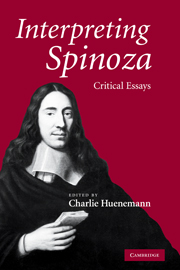Book contents
- Frontmatter
- Contents
- Notes on contributors
- Method of citation
- Introduction
- Chapter 1 Representation and consciousness in Spinoza's naturalistic theory of the imagination
- Chapter 2 Rationalism run amok: representation and the reality of emotions in Spinoza
- Chapter 3 “Whatever is, is in God”: substance and things in Spinoza's metaphysics
- Chapter 4 Necessitarianism in Spinoza and Leibniz
- Chapter 5 Epistemic autonomy in Spinoza
- Chapter 6 Spinoza and the philosophy of history
- Chapter 7 Democracy and the good life in Spinoza's philosophy
- Chapter 8 Spinoza's unstable politics of freedom
- Chapter 9 Should Spinoza have published his philosophy?
- Bibliography
- Index
Chapter 1 - Representation and consciousness in Spinoza's naturalistic theory of the imagination
Published online by Cambridge University Press: 22 September 2009
- Frontmatter
- Contents
- Notes on contributors
- Method of citation
- Introduction
- Chapter 1 Representation and consciousness in Spinoza's naturalistic theory of the imagination
- Chapter 2 Rationalism run amok: representation and the reality of emotions in Spinoza
- Chapter 3 “Whatever is, is in God”: substance and things in Spinoza's metaphysics
- Chapter 4 Necessitarianism in Spinoza and Leibniz
- Chapter 5 Epistemic autonomy in Spinoza
- Chapter 6 Spinoza and the philosophy of history
- Chapter 7 Democracy and the good life in Spinoza's philosophy
- Chapter 8 Spinoza's unstable politics of freedom
- Chapter 9 Should Spinoza have published his philosophy?
- Bibliography
- Index
Summary
Introduction
Spinoza identifies the minds or souls of finite things with God's ideas of those things. Margaret Wilson famously suggests that this identification prevents Spinoza from giving an adequate account of the human mind:
Descartes's position on the mind–body issue is notoriously beset with difficulties. Still, [his] theory of res cogitantes does recognize and take account of certain propositions about the mental that seem either self-evidently true or fundamental to the whole concept. These include … that the mind (in a straightforward and common sense of the term) represents or has knowledge of external bodies; that it is ignorant of much that happens in “its” body; that having a mind is associated with thinking and being conscious; that mentality is recognizable from behavior of a certain sort, and the absence of mentality from “behavior” of other sorts. Will not Spinoza's theory of “minds” simply fail to be a theory of the mental if it carries the denial of all or most of these propositions? More specifically, will it not fail to make sense of the specific phenomena of human mentality by attempting to construe the human mind as just a circumscribed piece of God's omniscience?
(Wilson 1980: 111)- Type
- Chapter
- Information
- Interpreting SpinozaCritical Essays, pp. 4 - 25Publisher: Cambridge University PressPrint publication year: 2008
- 20
- Cited by



